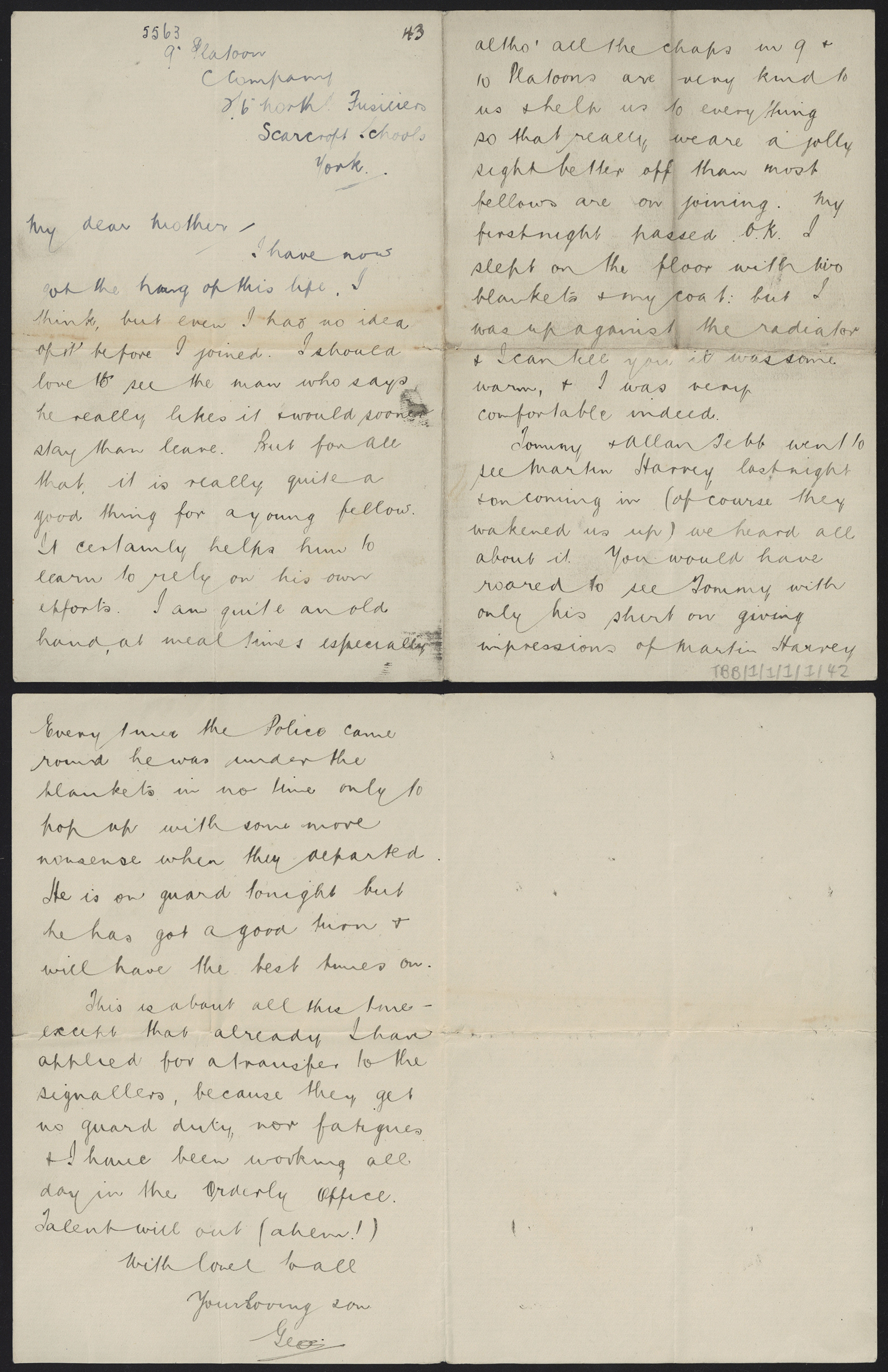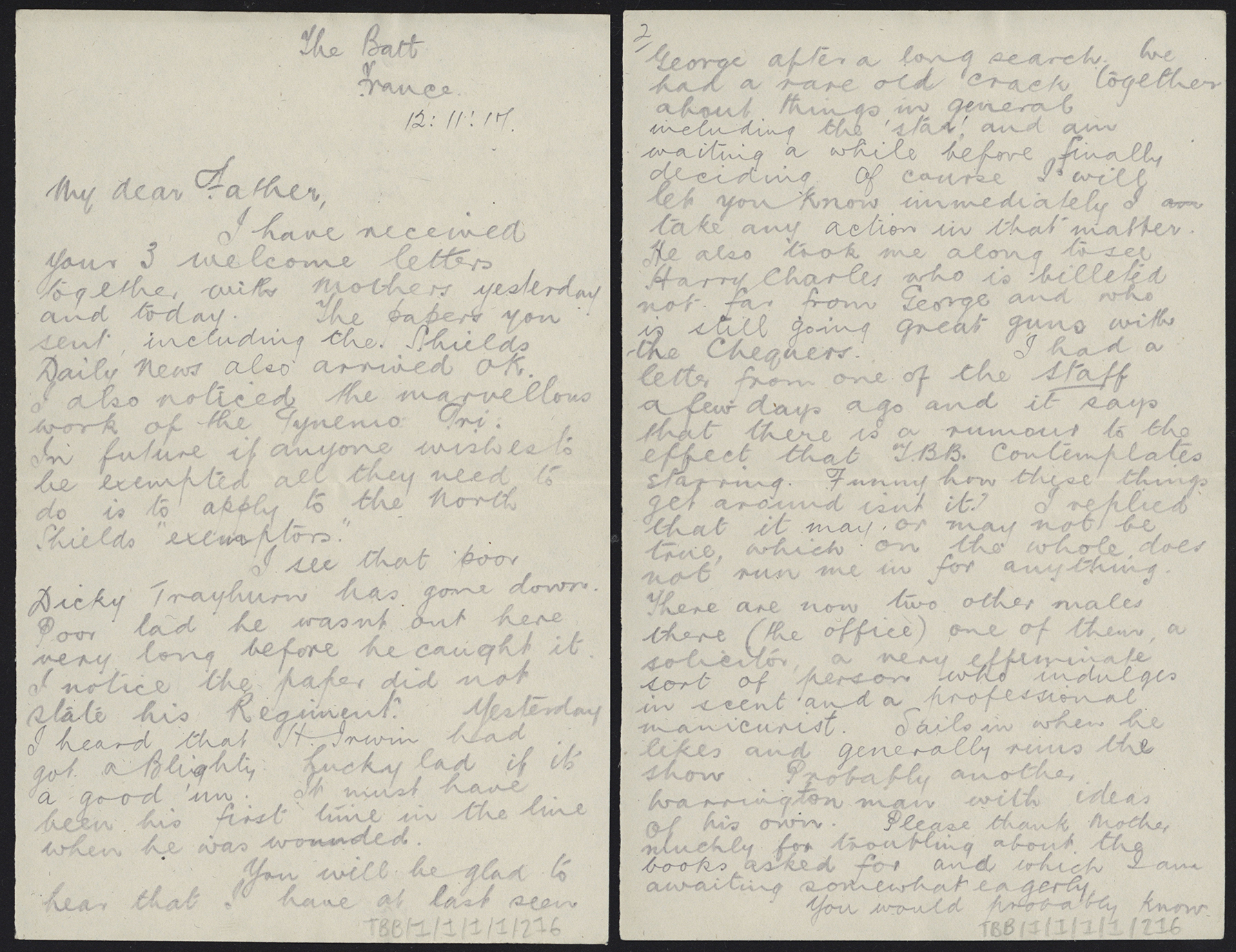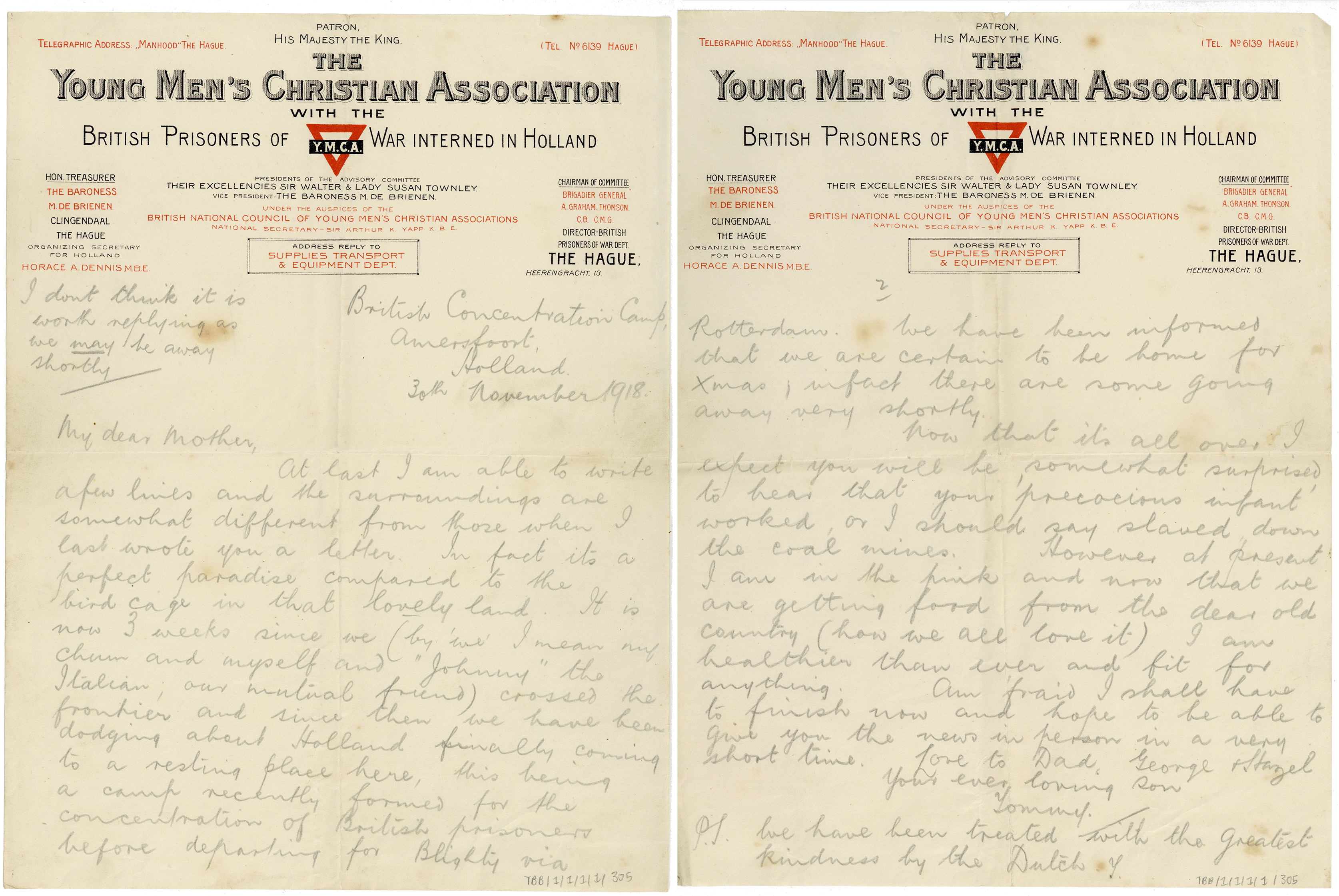
Photograph of Thomas Baker Brown in uniform wearing an ‘Imperial Service Badge’. Baker Brown (Thomas) Archive, TBB/1/3/1
This month, marks 100 years since the end of the 1st World War. Our Treasure of the Month is part of the archive of Thomas Baker Brown. Born locally in Tynemouth, he served in France during the 1st World War, was taken a prisoner of war in 1918 and served as a member of the Home Guard during the 2nd World War despite suffering sight damage attributed to his time in captivity.
A highlight of the archive from the period of the 1st World War is a series of over 300 letters written at regular intervals to his family. These cover the period from when he joined the army as an 18 year old, his training for, and participation in the Great War, his time as a Prisoner of War and his return home from Germany at the end of the war. Together they combine to tell a captivating first hand account of his journey from a civilian to an experienced member of the forces fighting in France and give a fascinating insight into daily life of those who fought for the country.
Thomas Baker Brown was born in Linskill Street, Tynemouth on the 22nd of December 1896 to parents Thomas Baker Brown and J.H. Brown, he had an older brother and would go on to have a younger sister. He remained with his family, living in and around Tynemouth, until he joined the army in late November 1915, a month before his 19th birthday.
After joining the army he spent 4 months training at a base near York at Scarcroft School. Whilst there he regularly wrote to family updating them on his progress through training and his life as a young soldier. At this stage his letters detail the training he has undertaken, life in the barracks and other local men who have signed up to fight.

Letter from Thomas Baker Brown to his mother from a training camp in York. He describes getting used to life the military life and applying for a transfer to the signallers. The letter is written from 9th Platton, ‘C’ Company, 2/6th Northumberland Fusiliers, Scarcroft Schools, York. Baker Brown (Thomas)Archive, TBB/1/1/1/1/42
This letter (above) is typical of those written whilst Baker Brown was at the training camp. In this letter he writes about getting used to military life and requesting a transfer the Signallers.
By July 1916 he’d joined the 2/6th Northumberland Fusiliers, 32nd Division as a signaller and travelled to France with them. Their number included his brother, George, who had signed up after his younger brother. He went on join the ranks taking took repeated turns on the front line, being awarded the Military Cross for his heroism and bravery in March 1917. Throughout this time he continued to keep in regular contact with his family back in Tynemouth whilst fighting and remaining uninjured. His letters home from the front discus his experiences on the front line, the weather in France, replies to the letters and parcels he was receiving from home, and the often sad fate those he knew from his home area who were wounded, or worse, in action.

Letter from Thomas Baker Brown to his father from France. He discusses friends who have died or been wounded, meeting his brother George and his plans to perhaps perform in a concert. The letter is signed Derek, a nickname used by Thomas Baker Brown. This letter is accompanied by an ‘honesty envelope’. Baker Brown (Thomas) Archive, TBB/1/1/1/1/216
In this letter from November 1917 (above), he talks about receiving a copy of the Shields Daily News from his parents and mentions other men from his local area who have died and been wounded recently.
He remained in France until late March 1918 when he was taken prisoner on the Arras Front at Bullecourt and transferred to Germany where he was held in Prisoner of War camps. He spent much of his time as a Prisoner of War in a camp at Limburg where he was required to work as a miner in a coal mine adjacent to the camp. Once he became a prisoner of war the frequency of his communications declined and were restricted to briefer postcards lacking the detail of his earlier letters.
As the war drew to a close and the armistice agreement was signed morale amongst the guards lessened to the extent that Baker Brown and 5 other detainees were able to walk out of camp on the morning of the 17th of November 1918 and attempt to travel home. He, and several other prisoners, made their way to a camp in the Netherlands where he was able to write to his parents letting them know the circumstances of his escape and his expectation of being home in time for Christmas.

Letter written on YMCA headed paper, from Thomas Baker Brown to his mother from a British Concentration Camp in Holland. He writes that he has crossed the frontier along with an Italian man, and they have ‘been dodging about Holland’ and now expect to be home for Christmas. Baker Brown (Thomas) Archive, TBB/1/1/1/1/305
Several years later he suffered damage to his eye sight which doctors attributed to his time as a prisoner of war. This would prevent him from re-joining the army and participating abroad in World War Two. However, he was able to join the Home Guard and play his part in the defence of the country. A number of items including diaries, correspondence and other documents covering his time as a member of the 4th Battalion Northumberland (Hexham) Home Guard form a significant part of the archive.
Images of the letters featured in this post, along with a selection of others written by Baker Brown to family during World War One, are available here on Collections Captured. A full online catalogue of the Thomas Baker Brown Archive is available here, along with the catalogue here of the archive Sir Lawrence Pattinson, another local man whose military career included the First World War.
